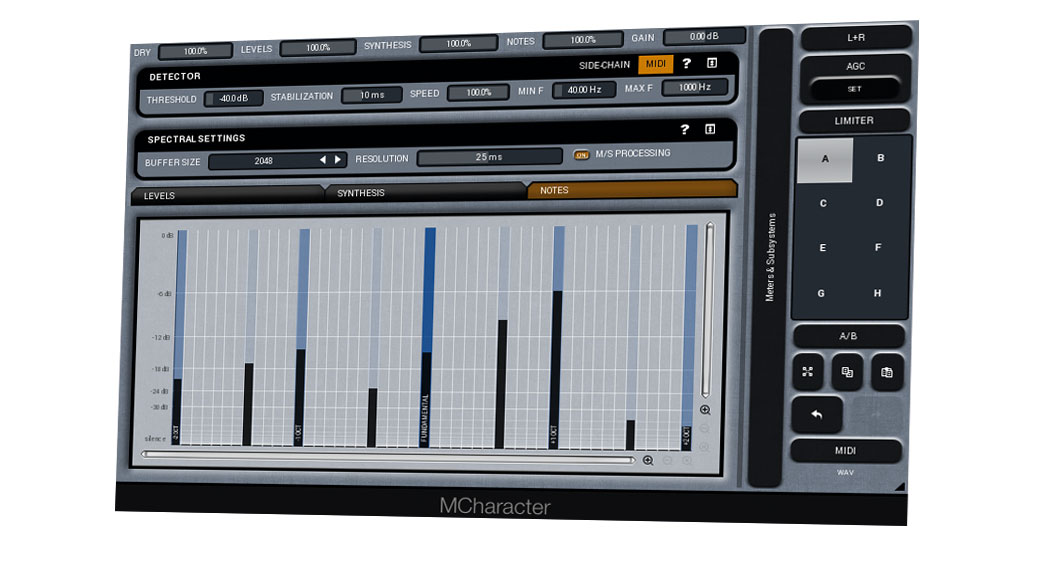MusicRadar Verdict
MCharacter successfully combines harmonic shaping and synthesis in a corrective and creative plugin, in a way we've simply never seen before.
Pros
- +
Simple, understandable interface. Innovative approach to sound shaping. Flexible detection engine. Synthesis adds creative potential.
Cons
- -
Accurate detection settings require skill. Limited to clear monophonic sources.
MusicRadar's got your back
MeldaProduction's latest effect, MCharacter (VST/AU/AAX), enables direct manipulation of harmonic content in monophonic sounds.
It does this using a pitch detector followed by three adjustment modules - Levels, Synthesis and Notes - each of which employs a bar graph-style display for adjustment.
Levels lets you rebalance up to 32 existing harmonics, from the fundamental to the fifth octave. Synthesis and Notes generate additional (level-adjustable) synthesised harmonics, each offering slightly different pitch scaling.
For Synthesis, this is a 32-part harmonic scale (from the fundamental to the fifth octave), much like Levels; while for Notes, it's a musical scale covering two octaves above and below the fundamental. Both synthesised options can be used concurrently.
Three sliders are used to balance module outputs (Levels, Synthesis and Notes), with a fourth slider blending in the Dry signal, and a fifth setting the overall master output Gain.
The Detector section analyses the pitch of the monophonic source signal. Its main adjustable parameters are Threshold (0 to -40dB) and two frequency limits (Min F and Max F), within which it operates. Further options are Stabilisation, providing a fixed delay to allow for inharmonic sounds, and Speed, which governs responsiveness to pitch change.
MCharacter is a frequency domain processor that buffers the incoming audio, and you can adjust the Buffer size and Resolution to balance CPU hit, latency and processing accuracy.
Finally, MCharacter uses MeldaProduction's standard plugin framework, so deep parameter modulation (with five Modulator modes), macro controls (Multiparameters), and visual Style customisation are all onboard.
Pitch perfect
MCharacter is reasonably easy to get to grips with, and the interface is intuitive. Nonetheless, it's worth saying that all three modules are reliant on the accuracy of the Detector and Spectral settings, and in practice, adjusting these requires a certain amount of trial and error - we found that different buffer sizes worked better for different types of sound.
The Speed, Stabilisation and Threshold parameters massively influence the outcome, and we found that turning down the Dry level and monitoring just the synthesised harmonics while tweaking them helped us get the most stable results.
This allowed us to add a reliable sub bass layer to an existing electric bass, and to generate some wonderful artificial-sounding synthesised harmonics from flute and picked guitar.
So, as well as being a corrective plugin, MCharacter doubles as a slightly out-there effects generator, with a handful of presets ably demonstrating this side of it, using modulation to add movement to multiple harmonics.
MCharacter is a plugin of two halves. On 'real' instruments (where any hint of 'synthesis' could be a deal breaker), adjusting existing harmonics can be surprisingly effective with careful setting of the detection parameters.
On the other hand, though, its synthesis engine can generate both subtle and overt harmonic enhancements that aren't possible with regular EQ, and it's this side of the plugin that we like the most.
Computer Music magazine is the world’s best selling publication dedicated solely to making great music with your Mac or PC computer. Each issue it brings its lucky readers the best in cutting-edge tutorials, need-to-know, expert software reviews and even all the tools you actually need to make great music today, courtesy of our legendary CM Plugin Suite.
“Gloriously adorned with a gold edge burst finish over a gold paisley and sparkle top”: Gretsch unveils the Paisley Penguin – a rare bird that growls – and the Honey Dipper Special, a resonator for all your roots rock manoeuvres
“It’s radical. It’s like magic. I get chills”: How Rick Rubin’s philosophy of chance led System of a Down to the first metal masterpiece of the 21st century
“A guitar with the same style and massive sound Eddie Van Halen created all at an affordable price”: EVH Gear reimagines the Wolfgang Standard as a high-performance shredder with a TOM bridge











